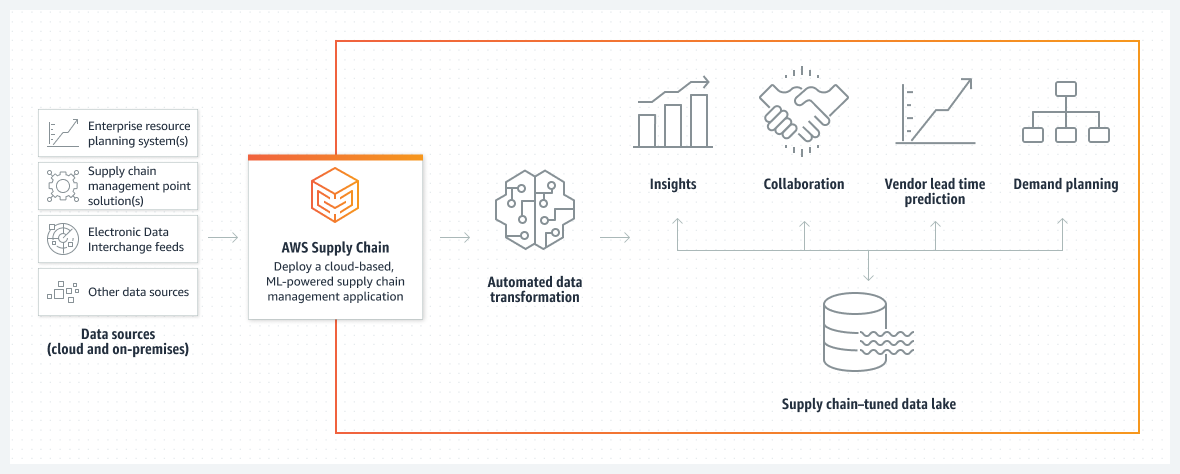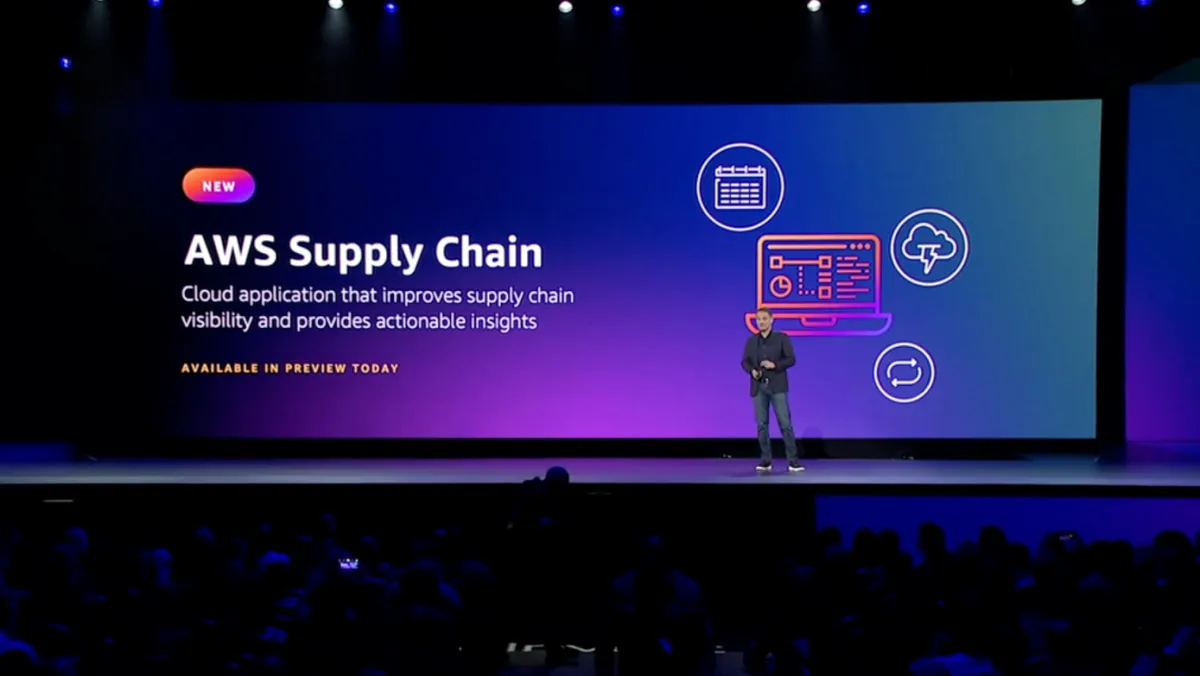Through applying breakthrough technologies and adopting daring supply chain tactics, Amazon has transformed the retail industry. The history of the internet shop is one of quick expansion and constant innovation. The supply chain is changing, and rivals cannot keep up.
The net revenue from Amazon.com's service and e-commerce sales increased significantly between 2004 and 2021. The worldwide e-commerce company's net revenue increased from 386 billion US dollars in 2020 to approximately 470 billion US dollars in the most recent reported year.
In the supply chain industry, Amazon is making a name for itself. While Amazon may be known for its e-commerce hub, it's now moving into shipping and logistics. It's taking over how package deliveries are handled for sellers and consumers. It's also making its presence known in the last stage of the delivery process — from logistic companies to consumers' doorsteps.
AWS Supply Chain and How Does it Work?
AWS supply chain is a solution that helps you manage your entire supply chain process, including procurement, inventory management, transportation management, order fulfillment, and customer service.
Supply chain managers can save costs and manage risks more effectively using the cloud-based AWS Supply Chain application. By reducing stockouts, AWS Supply Chain helps you improve customer service levels and cut costs associated with overstock. It also unifies supply chain data, offers actionable insights powered by machine learning (ML), and offers built-in contextual collaboration.
AWS Supply Chain offers targeted watchlists, ML-powered insights, and a real-time visual map feature to show the level and health of inventory at each location. AWS Supply Chain offers inventory rebalancing suggestions and integrated, contextual collaboration tools that make it simpler to coordinate across teams to implement solutions when risk is discovered. AWS Supply Chain may integrate your current enterprise resource planning (ERP) and supply chain management solutions without re-platforming, upfront license costs, or long-term commitments.

AWS Supply Chain - Featured solutions
AWS supply chain solution can help your business by providing the following:
Supply Chain Visibility
Gain complete visibility into your entire supply chain from sourcing through delivery and return. This allows you to track every product regardless of its location or status. You can also gain visibility into transportation routes and shipping schedules to ensure that your products arrive on time.
Warehouse Management
Warehouse management is one of the most critical aspects of the supply chain. It involves the planning, execution, control, and improvement of warehouse activities. With AWS, you can quickly improve your inventory management and warehouse operations through intelligent automation.
Transportation and Logistics
Manage all aspects of transportation, including routing, planning and scheduling shipments, managing fleets, and monitoring fuel consumption for trucks or other transport vehicles using dedicated software for each purpose. This enables you to optimize your fleet utilization by reducing idle time at ports or terminals or during loading/unloading operations.
Robotics and Automation
Automation in today's lean supply chains is vital in improving productivity and reducing costs. Robotics has been around for decades but has only recently become mainstream thanks to technological advances.
Some common uses for robotics include:
- Picking products from shelves using robotic arms;
- Fulfilling orders using automated robots;
- Counting inventory using machine vision systems
Inventory Optimization
Inventory optimization helps you eliminate excess inventory levels and avoid stockouts at any given time. This solution enables you to align your production with demand by setting up rules that manage your inventory based on real-time data from multiple sources, such as sales forecasts, market trends, and others.
AWS Supply Chain Use Cases
Supply chain use cases in AWS include:
Unify Supply Chain Data: Create a shared view of your entire supply chain and its operations.
Reveal Risks and Derive Insights: Use machine learning to detect anomalies that could lead to delays and quality issues, so you can take action before problems occur.
Take the Right Action Quickly: Automate processes wherever possible, so you don't have to manually approve every transaction or change orders.
Deliver on Customer Promises: Ensure that your customers receive the right product at the right time, every time—and if they don't, quickly find out why and take corrective action.
How AWS Helps Supply Chain Industry?
The business benefits of using the AWS supply chain are:
Ensure Product Availability - AWS Supply Chain helps ensure that your products are always available. You can also use it to predict inventory needs so you know when to order more products and when to cut back on orders.
Optimize Inventory Levels - AWS Supply Chain helps you optimize inventory levels by forecasting demand and choosing the best location for each item in your warehouse.
Improved Forecast Accuracy - By using the most appropriate combination of data sources, you can achieve greater accuracy than ever before.
Reduced Inventory Costs - Automate inventory replenishment processes using real-time signals from your point-of-sale systems.
Cut Supply Chain Costs - By using AWS Supply Chain, you can cut supply chain costs through more efficient management of your inventory, shipping, and other related processes.
Improved Capacity Utilization - Optimize your warehouse space by using more efficient routing algorithms considering real-time demand signals.
How is Amazon Disrupting the Supply Chain Landscape?
Even though Amazon has only been operating for a few decades, they have already significantly altered how retail works. And Amazon's supply chain management system is one of the primary reasons it has become one of the most rapidly expanding businesses in the world.
It's not just the online retailer shaking up the global supply chain landscape — Amazon has also been disrupting the traditional supply chain model with its own logistics network. The fulfillment process for products ordered on Amazon has been automated through robotics and technology to ensure that products are handled efficiently. This has allowed Amazon to scale quickly and offer same-day delivery services to customers across the globe.
Amazon makes the game of last-mile logistics seem simple. Amazon's well-oiled and well-optimized logistics methodology is one of the essential contributing aspects to its near-universal success, and the company is revolutionizing supply chain management.
Future of Supply Chain Management
The future of the supply chain with AWS is an interesting one. Experts have predicted that cloud computing will significantly impact the logistics industry in the coming years, and Amazon will likely do its part to try to help this prediction come to fruition. The cultural shift towards decentralized computing, achieved through cloud solutions like those provided by Amazon, is underway. Its effects are evident across different industries, and they are sure to change the enterprise logistics industry as well.

